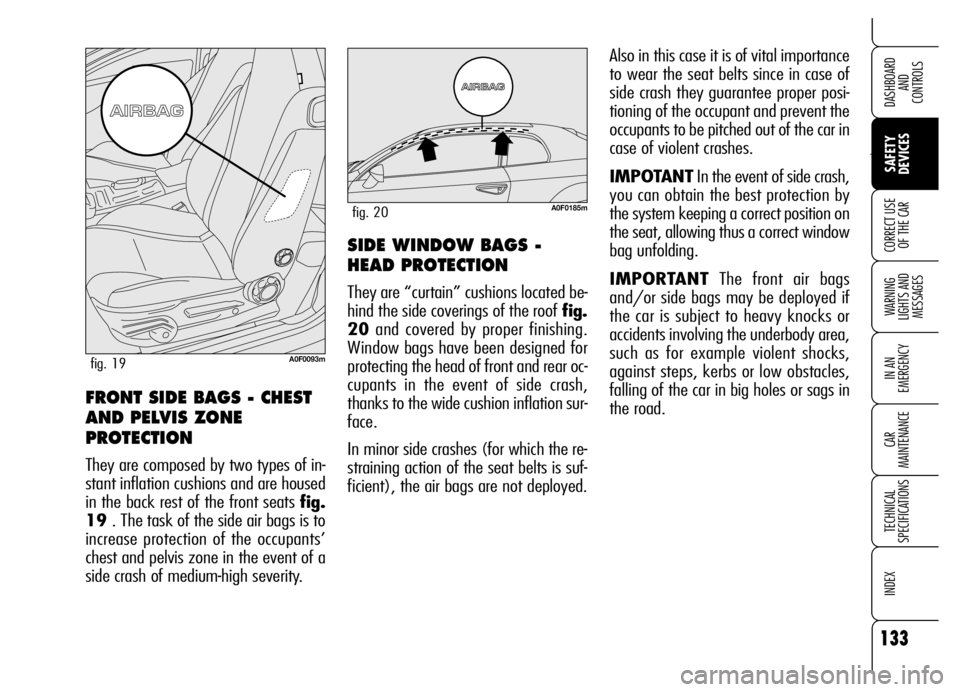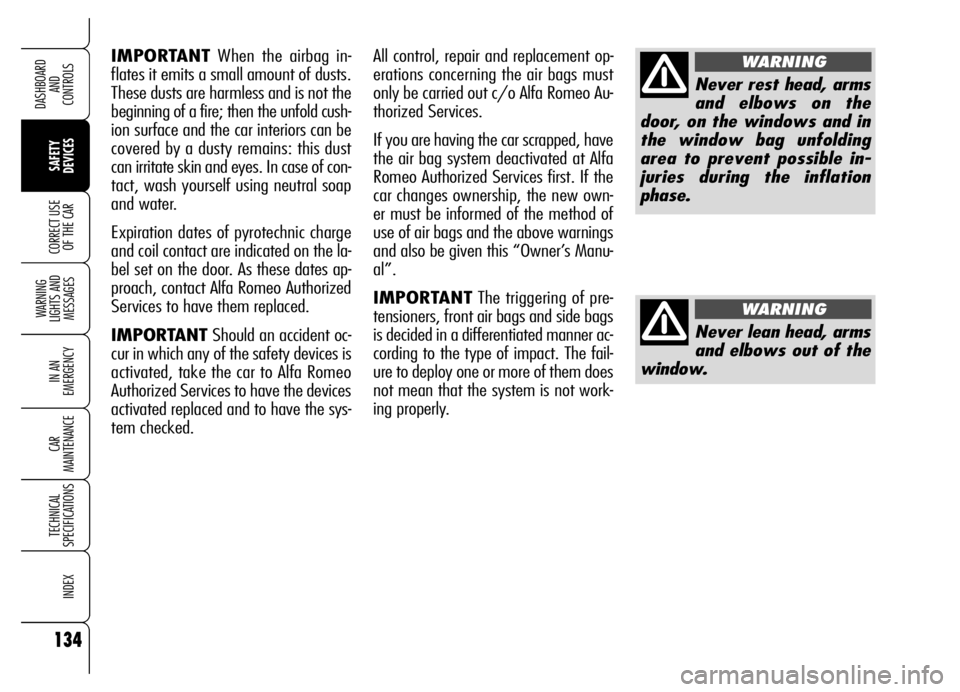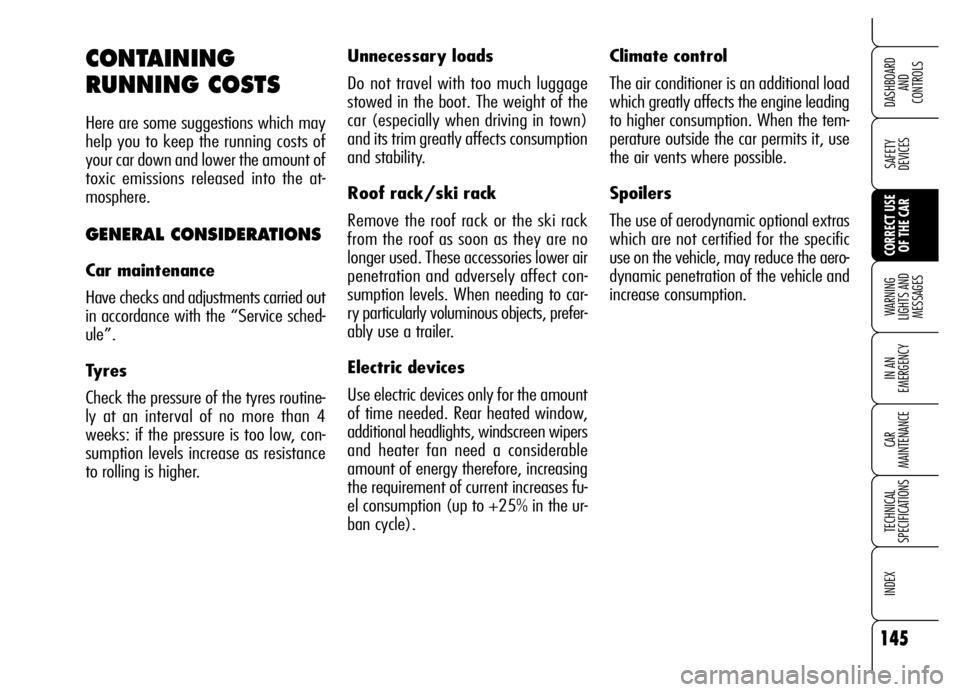2006 Alfa Romeo Brera/Spider window
[x] Cancel search: windowPage 117 of 267

115
Ù
SAFETY
DEVICES WARNING
LIGHTS AND
MESSAGES
IN AN
EMERGENCY
CAR
MAINTENANCE
TECHNICAL
SPECIFICATIONS
INDEX
DASHBOARD
AND
CONTROLS
CORRECT USE
OF THE CAR
S S S S
A A A A
F F F F
E E E E
T T T T
Y Y Y Y
D D D D
E E E E
V V V V
I I I I
C C C C
E E E E
S S S S
SEAT BELTS ....................................................... 116
S.B.R. SYSTEM ................................................. 118
PRETENSIONERS ................................................ 119
CARRYING CHILDREN SAFELY ............................... 123
FRONT AIR BAGS................................................ 128
SIDE AIR BAGS (Side bag - Window bag) ............. 132
Page 134 of 267

132
SAFETY
DEVICES
WARNING
LIGHTS AND
MESSAGES
IN AN
EMERGENCY
CAR
MAINTENANCE
TECHNICAL
SPECIFICATIONS
INDEX
DASHBOARD
AND
CONTROLS
CORRECT USE
OF THE CAR
❒passenger’s front air bag, knees air
bag (where provided) and side bag
deactivated (positionOFFF):
warning light Fon front ceiling
light panel on; it is possible to carry
a child protected by special restraint
systems on the front seat.
The warning light Fon front ceiling
light panel stays on permanently until
the passenger’s air bags are reactivat-
ed.
Passenger’s air bags deactivation will
not inhibit the operation of the Window
Bag.SIDE AIR BAGS
(Side bag -
Window bag)
The car is fitted with front side bags for
driver and passenger for protecting the
chest and window bags for protecting front
and rear occupant’s head.
Side bags protect car occupants from
side crashes of medium-high severity, by
placing the cushion between the occu-
pant and the internal parts of the side
structure of the car.
Non-activation of side bags in other
types of collisions (front collisions, rear
shunts, roll-overs, etc...) is not a system
malfunction.In case of side crash, an electronic con-
trol unit, when required triggers the in-
flation of the cushion. The cushion im-
mediately inflates, placing itself as a pro-
tection, between the occupant’s body
and the structure that could cause in-
juries. Immediately after, the cushion de-
flates.
Side air bags are not a replacement of
but complementary to the belts, which
you are recommended to always wear,
as specified by law in Europe and most
non-European countries.
Page 135 of 267

133
Ù
SAFETY
DEVICES WARNING
LIGHTS AND
MESSAGES
IN AN
EMERGENCY
CAR
MAINTENANCE
TECHNICAL
SPECIFICATIONS
INDEX
DASHBOARD
AND
CONTROLS
CORRECT USE
OF THE CARSIDE WINDOW BAGS -
HEAD PROTECTION
They are “curtain” cushions located be-
hind the side coverings of the roof fig.
20and covered by proper finishing.
Window bags have been designed for
protecting the head of front and rear oc-
cupants in the event of side crash,
thanks to the wide cushion inflation sur-
face.
In minor side crashes (for which the re-
straining action of the seat belts is suf-
ficient), the air bags are not deployed.Also in this case it is of vital importance
to wear the seat belts since in case of
side crash they guarantee proper posi-
tioning of the occupant and prevent the
occupants to be pitched out of the car in
case of violent crashes.
IMPOTANTIn the event of side crash,
you can obtain the best protection by
the system keeping a correct position on
the seat, allowing thus a correct window
bag unfolding.
IMPORTANTThe front air bags
and/or side bags may be deployed if
the car is subject to heavy knocks or
accidents involving the underbody area,
such as for example violent shocks,
against steps, kerbs or low obstacles,
falling of the car in big holes or sags in
the road.
FRONT SIDE BAGS - CHEST
AND PELVIS ZONE
PROTECTION
They are composed by two types of in-
stant inflation cushions and are housed
in the back rest of the front seats fig.
19 . The task of the side air bags is to
increase protection of the occupants’
chest and pelvis zone in the event of a
side crash of medium-high severity.
A0F0093mfig. 19
A0F0185mfig. 20
Page 136 of 267

134
SAFETY
DEVICES
WARNING
LIGHTS AND
MESSAGES
IN AN
EMERGENCY
CAR
MAINTENANCE
TECHNICAL
SPECIFICATIONS
INDEX
DASHBOARD
AND
CONTROLS
CORRECT USE
OF THE CAR
IMPORTANTWhen the airbag in-
flates it emits a small amount of dusts.
These dusts are harmless and is not the
beginning of a fire; then the unfold cush-
ion surface and the car interiors can be
covered by a dusty remains: this dust
can irritate skin and eyes. In case of con-
tact, wash yourself using neutral soap
and water.
Expiration dates of pyrotechnic charge
and coil contact are indicated on the la-
bel set on the door. As these dates ap-
proach, contact Alfa Romeo Authorized
Services to have them replaced.
IMPORTANTShould an accident oc-
cur in which any of the safety devices is
activated, take the car to Alfa Romeo
Authorized Services to have the devices
activated replaced and to have the sys-
tem checked.All control, repair and replacement op-
erations concerning the air bags must
only be carried out c/o Alfa Romeo Au-
thorized Services.
If you are having the car scrapped, have
the air bag system deactivated at Alfa
Romeo Authorized Services first. If the
car changes ownership, the new own-
er must be informed of the method of
use of air bags and the above warnings
and also be given this “Owner’s Manu-
al”.
IMPORTANTThe triggering of pre-
tensioners, front air bags and side bags
is decided in a differentiated manner ac-
cording to the type of impact. The fail-
ure to deploy one or more of them does
not mean that the system is not work-
ing properly.
Never rest head, arms
and elbows on the
door, on the windows and in
the window bag unfolding
area to prevent possible in-
juries during the inflation
phase.
WARNING
Never lean head, arms
and elbows out of the
window.
WARNING
Page 147 of 267

145
SAFETY
DEVICES
WARNING
LIGHTS AND
MESSAGES
IN AN
EMERGENCY
CAR
MAINTENANCE
TECHNICAL
SPECIFICATIONS
INDEX
DASHBOARD
AND
CONTROLS
CORRECT USE
OF THE CAR
Climate control
The air conditioner is an additional load
which greatly affects the engine leading
to higher consumption. When the tem-
perature outside the car permits it, use
the air vents where possible.
Spoilers
The use of aerodynamic optional extras
which are not certified for the specific
use on the vehicle, may reduce the aero-
dynamic penetration of the vehicle and
increase consumption. Unnecessary loads
Do not travel with too much luggage
stowed in the boot. The weight of the
car (especially when driving in town)
and its trim greatly affects consumption
and stability.
Roof rack/ski rack
Remove the roof rack or the ski rack
from the roof as soon as they are no
longer used. These accessories lower air
penetration and adversely affect con-
sumption levels. When needing to car-
ry particularly voluminous objects, prefer-
ably use a trailer.
Electric devices
Use electric devices only for the amount
of time needed. Rear heated window,
additional headlights, windscreen wipers
and heater fan need a considerable
amount of energy therefore, increasing
the requirement of current increases fu-
el consumption (up to +25% in the ur-
ban cycle).CONTAINING
RUNNING COSTS
Here are some suggestions which may
help you to keep the running costs of
your car down and lower the amount of
toxic emissions released into the at-
mosphere.
GENERAL CONSIDERATIONS
Car maintenance
Have checks and adjustments carried out
in accordance with the “Service sched-
ule”.
Tyres
Check the pressure of the tyres routine-
ly at an interval of no more than 4
weeks: if the pressure is too low, con-
sumption levels increase as resistance
to rolling is higher.
Page 154 of 267

152
SAFETY
DEVICES
WARNING
LIGHTS AND
MESSAGES
IN AN
EMERGENCY
CAR
MAINTENANCE
TECHNICAL
SPECIFICATIONS
INDEX
DASHBOARD
AND
CONTROLS
CORRECT USE
OF THE CAR
CAR INACTIVITY
If the car is to be left inactive for longer
than a month, the following precautions
should be noted:
❒park the car in covered, dry and if
possible well-ventilated premises;
❒engage a gear;
❒check that the handbrake is not en-
gaged;
❒disconnect battery negative terminal
and check the battery charge. This
check is to be repeated every three
months when the car is left inactive.
Recharge if the optical indicator
shows a dark colour without the cen-
tral green area (see paragraph “Bat-
tery” in section “Car maintenance”);
❒clean and protect the painted parts
using protective wax;
❒clean and protect the shiny metal
parts using special compounds read-
ily available;
❒sprinkle talcum powder on the rub-
ber windscreen and rear window
wiper blades and lift them off the
glass;
❒slightly open the windows;
❒cover the car with a cloth or perfo-
rated plastic sheet. Do not use sheets
of non-perforated plastic as they do
not allow moisture on the car body
to evaporate;
❒inflate tyres to +0.5 bar above the
normal specified pressure and check
it at intervals;
❒if you don’t disconnect the battery
from the electric system, check its
charge every month and recharge it
if the optical indicator shows a dark
colour without the central green
area;
❒do not drain the engine cooling sys-
tem.
IMPORTANTIf the car is fitted with
alarm system, switch off the alarm with
the remote control.
Page 202 of 267

200
SAFETY
DEVICES
WARNING
LIGHTS AND
MESSAGES
IN AN
EMERGENCY CAR
MAINTENANCE
TECHNICAL
SPECIFICATIONS
INDEX
DASHBOARD
AND
CONTROLS
CORRECT USE
OF THE CAR
USERS FUSE AMPERE FIGURE
Climate control system fan F02 (MAXI-FUSE) 40 52
Electric steering lock F03 (MAXI-FUSE) 20 52
Brake branch point (pump) F04 (MAXI-FUSE) 40 52
Brake branch point (solenoid valve) F05 (MAXI-FUSE) 40 52
Radiator fan (low speed) F06 (MAXI-FUSE) 40 52
Radiator fan (high speed) F07 (MAXI-FUSE) 50 52
Headlight washer F09 20 52
Horns F10 15 52
Electronic injection sundry secondary services F11 15 52
+ INT for electronic injection system F16 7.5 52
Electronic injection primary services F17 10 52
Engine control branch point F18 15 52
Climate control system compressor F19 7.5 52
Rear window heating F20 20 52
Fuel pump supply F21 20 52
Ignition coils/injectors (petrol versions) F22 15 52
Electronic injection primary services (diesel versions) F22 20 52
Sound system/Radionavigation system power F23 15 52
Body Computer branch point/Headlight washer relay coil F31 7.5 48
Driver’s door branch point/passenger’s door branch point/ignition
device F32 15 48
Disponible F33 – 48
Disponible F34 – 48
Page 203 of 267

201
SAFETY
DEVICES
WARNING
LIGHTS AND
MESSAGES
IN AN
EMERGENCY CAR
MAINTENANCE
TECHNICAL
SPECIFICATIONS
INDEX
DASHBOARD
AND
CONTROLS
CORRECT USE
OF THE CAR
USERS FUSE AMPERE FIGURE
Water in diesel fuel filter sensor/flow meter F35 7.5 48
Brake light switch/central console control panel F35 7.5 48
Cruise Control F35 7.5 48
AQS sensor F35 7.5 48
Disponible F36 – 48
Instrument panel branch point F37 10 48
Front headlight control unit/Power to control unit
for gas-discharge headights (Bixenon) (where provided) F37 10 48
Boot locking/unlocking gearmotor F38 15 48
EOBD system diagnostic socket F39 10 48
T.P.M.S. control unit F39 10 48
Mobile phone presetting F39 10 48
Alarm system control unit (where provided) F39 10 48
Climate control system F39 10 48
Heated rear window F40 30 48
Windscreen washer/rear window washer nozzle demister F41 7.5 48
Heated mirror demister F41 7.5 48
Brake branch point power (ABS/VDC) –
Steering angle branch point – Yawing sensor F42 7.5 48
Windscreen wiper/washer F43 30 48